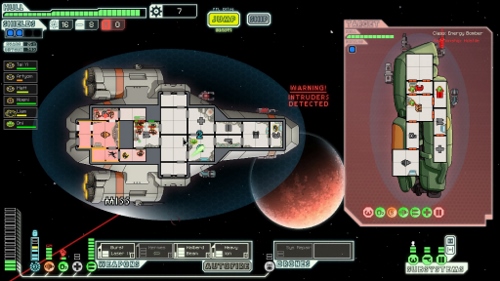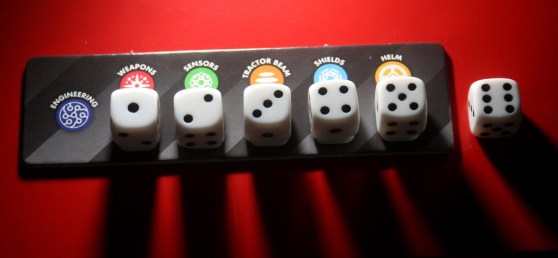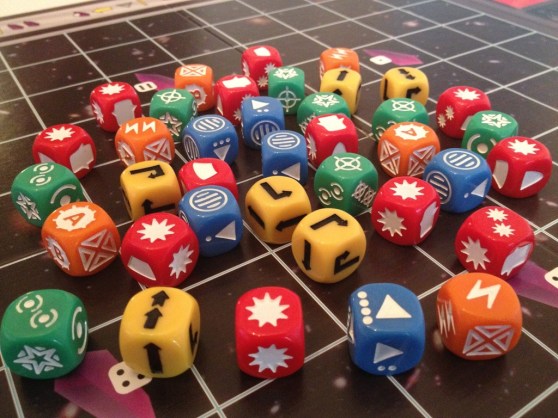This new, ongoing series covers tabletop board or card games that video gamers should dig. Check here for more.
Space Cadets: Dice Duel
Video games that Dice Duel reminds us of: Star Trek: Bridge Commander, FTL: Faster Than Light, Spaceteam, Artemis Spaceship Bridge Simulator
- Publisher: Stronghold Games
- # of players: 4-8 (team play)
- Cost: $50 (preorders available for $35 for a limited time)
- To learn: Really easy, with a clear video tutorial. One quick walkthrough of the different stations should be enough to get started.
- To play: Very easy. Mistakes (and misfires) will happen, but that’s part of the fun.
- Noteworthy: Dice Duel has no turns! All players are rolling dice at the same time, all the time — it’s like a Yahtzee orgy.
Our guess is that the people who work at tabletop-gaming company Stronghold Games don’t have very many friends. If this is true, we’ll take another guess that its upcoming Space Cadets: Dice Duel is probably the source of the problem.
The first Space Cadets (which came out last year and which we’ll be writing about later in this series) has players working cooperatively, running “the bridge of a non-IP [intellectual property]-infringing starship,” as Stronghold Games president Stephen Buonocore described it to GamesBeat, covering his bases with a little joke. In that game, everyone’s in one happy (or potentially doomed) family.
But in sequel Dice Duel, two starships, each manned by a crew of two to four players each, go head-to-head in team play. And instead of the wide variety of minigames from the original, it has “20-30 minutes of frantic dice-rolling and yelling at each other about what you need your team to do,” said Buonocore. (See what we mean about his potential lack of friends?)
His is a 100 percent accurate description of the gameplay here. This is a wild game. Mood swings, screaming, scheming, confusion, chaos … it’s all part of the fun and culminates in a huge celebration and outpour of relief for the winning team — and total dejection for the other guys.
At first, Dice Duel takes a little getting used to because it’s probably like nothing most people have ever played. It literally has no turns. (The mechanic of nonstop dice-rolling, however, is not new to tabletop gaming.) Except for quick breaks to resolve torpedo strikes and a couple of other events, the main action never stops. Both teams are simultaneously going at it as quickly as possible.
It starts with the engineering officer, who rolls dice with the normal pips that we’re all familiar with. Depending on what numbers pop up, he can either reroll them or distribute them to their assigned stations as energy (6s are useless):
Then, depending on how many white dice (units of energy) the other officers get from engineering, they can start to roll their own specialized dice to power up or activate their own stations. The weapons officer, for example, rolls his red dice until he can assemble the three different faces/sections of a single torpedo, which he can then load into a firing tube. He can’t launch one, however, unless the sensors officer has some weapon locks rolled and ready. Meanwhile, the tractor beam officer is prepping to capture the valuable purple crystals strewn about the board which act as power-ups. The shield officer can raise shields, but the dice determine on which sides. Finally, the helm officer is rolling to see how the ship moves and is doing his best to point it the right way (to fire at the enemy) or to avoid running into asteroids, mines, or nebulae.
All players have unlimited rerolls, so if they’re ever unhappy with the results, they can just try again. And when the individual officers are done loading this or powering up that? They return the normal white dice, so the engineering officer can start rolling them again to reassign new energy to other stations. (See the gallery below for more.)
Again, the key is, the action rarely stops. Everyone’s rolling and rerolling dice, passing them back and forth to each other, and trying to communicate and coordinate (usually by yelling more and more loudly) — all at the same time.
And people will screw up. One of our friends — we’ll call him Andrew Kelly to not protect his identity because he deserves the public shaming (and a demotion from weapons officer on Team Seanbaby) — kept prematurely shouting “Fire 1!” (It happens to a lot of guys his age.) It was his sad attempt to launch a torpedo, only to discover that things on the board have changed since he last checked seven seconds ago. Out of range, ship’s now facing the wrong direction, not enough weapon locks, or too many new enemy jammers — the situation is always fluid, and it’s a lot to keep track of in real time. But it’s never too complicated, and it’s worth saying again: It’s all part of the fun.
Now we understand why Captain Kirk and Spock’s relationship is always under strain. But hey, we can think of much worse ways for friendships to get obliterated.
Bottom line: Space Cadets: Dice Duel captures the excitement of the video games mentioned at the top of this article very well. It does feel like you and your friends are running a big starship with lots of moving and exploding parts. It’s not for everyone (though it’s very family-friendly). It can actually be too stressful and chaotic for those who prefer more strategy — or a calm, relaxing evening. But it’s just so crazy and unique that any gaming group with enough players (we recommend six or eight) ought to try it.
More images:
VentureBeat's mission is to be a digital town square for technical decision-makers to gain knowledge about transformative enterprise technology and transact. Learn More










